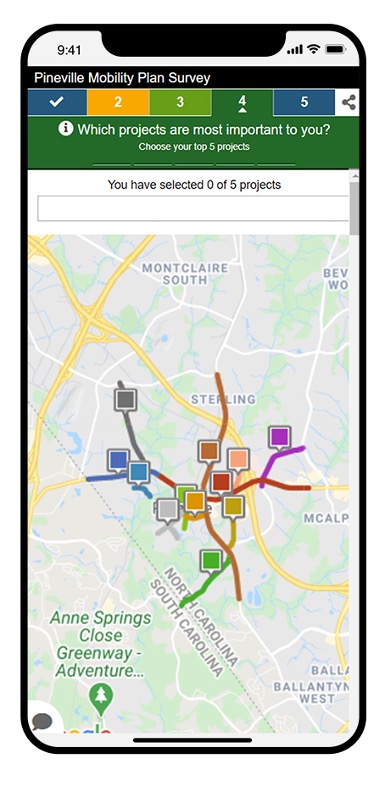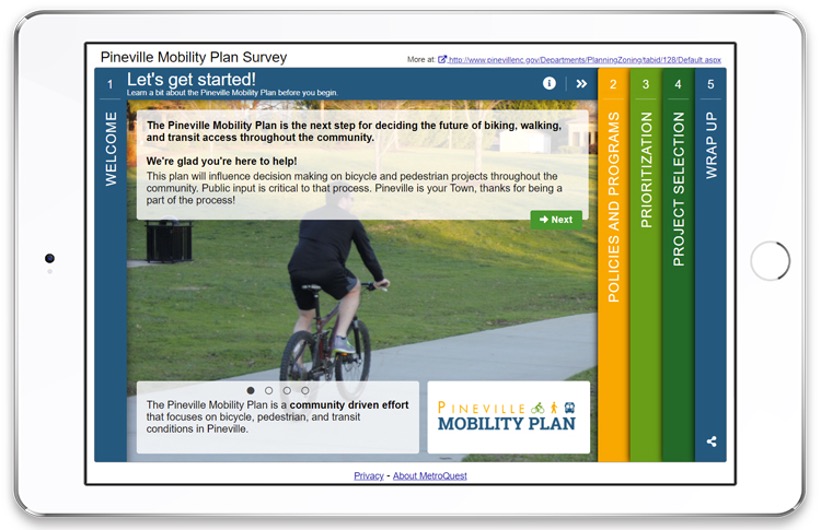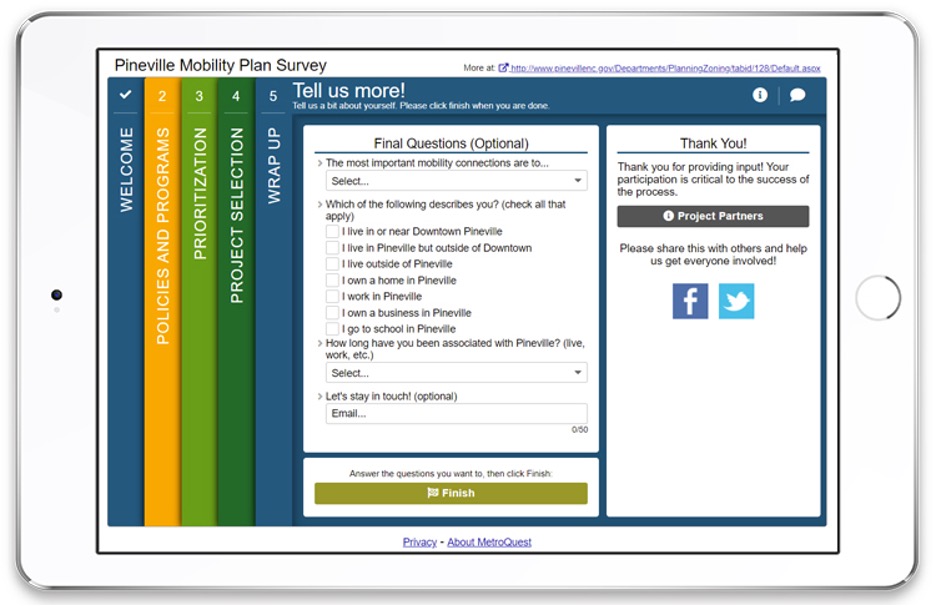[SURVEY OF THE MONTH] Community-Driven Efforts Towards Mobility with MetroQuest 2020
![[SURVEY OF THE MONTH] Community-Driven Efforts Towards Mobility with MetroQuest 2020](https://metroquest.com/wp-content/uploads/SOTM_Pineville_Header-Image.jpeg)
For the past 9 months, we have been bringing you the Survey of the Month—a noteworthy example of a MetroQuest survey created by one of our customers—and we continue to be excited about sharing the many fantastic surveys that we see every day.
This month is particularly exciting for us at MetroQuest because for the first time, we are highlighting a survey on our new platform: MetroQuest 2020! We are thrilled to showcase not only an amazing survey on a very relevant topic, but also to use it to shine a spotlight on some great new features that are available to all customers who have made the switch to MetroQuest 2020. If you haven’t yet, get in touch with me today to schedule your orientation session!
What’s the story? Identifying Current and Future Needs for Pineville’s Mobility Plan
The March Survey of the Month supports a mobility plan in Pineville, NC, that the Town of Pineville created in conjunction with their consultant and long-standing MetroQuest customer Kimley-Horn. This community driven effort focuses on improving biking and walking accessibility in the community, as well as transit in Pineville. The goal of the study is to identify current and future needs in order to develop recommendations for a safe and easy-to-use multimodal transportation system. The survey was created as a follow-up to an in-person public meeting, and as a way to gather more input from the community.
For more information, please review the mobility plan report.
Anatomy of a Survey: Designing for Community-First Mobility in Pineville
All MetroQuest surveys have five components, called Screens, and start with a Welcome Screen that introduces the project and Wrap Up Screen that concludes the survey. Like many of our surveys, the Pineville Mobility Survey starts the interactive portion of the survey with a Priority Ranking Screen where visitors are asked to rank their top 5 policies out of a list of 8, then continues on to a Strategy Rating Screen where participants are asked to weigh in on where mobility is most needed.
Both of these Screens, particularly in this order, are great ways to gather input while also warming up participants to online engagement. You can read more about using Priority Ranking and Strategy Rating Screens in my blog about long-range transportation planning in Northeastern Pennsylvania.
 I want to focus on Pineville’s fourth interactive Screen, a Project Selection Screen, for a multitude of reasons. The Screen shows 12 different possible projects on a map, with a task for participants to choose their top 5. This is not a frequently used Screen as it is much more specific in its use than, for example, a prioritization exercise—perhaps the most common exercise in engagement for planning. The Project Selection Screen is best suited for a project that already has planned alternatives, which are ideally geographic in nature. If your project has alternatives that can be shown on a map, this Screen is an incredibly effective way to gather input and tease out which alternative(s) should become a reality in the point of view of the public.
I want to focus on Pineville’s fourth interactive Screen, a Project Selection Screen, for a multitude of reasons. The Screen shows 12 different possible projects on a map, with a task for participants to choose their top 5. This is not a frequently used Screen as it is much more specific in its use than, for example, a prioritization exercise—perhaps the most common exercise in engagement for planning. The Project Selection Screen is best suited for a project that already has planned alternatives, which are ideally geographic in nature. If your project has alternatives that can be shown on a map, this Screen is an incredibly effective way to gather input and tease out which alternative(s) should become a reality in the point of view of the public.
Let’s dig a little deeper. The Project Selection Screen presents a Google Map with a number of colored segments, each with a corresponding marker that, when clicked, describes the project and asks for input. In this case, participants are asked to answer “yes/no” to the question of whether this project should be a priority. It is a very visual way to present alternatives and a simple exercise with great impact for planning purposes as it collects clear-cut data on top priority projects. It is particularly well-suited to transportation surveys where alternative alignments are under consideration for a corridor, or as in this case, where different possible multi-use paths or bike lanes are being considered.
To try the survey, visit the demo version here. This will not affect the survey results.
5 Tips from the Pineville Mobility Plan Survey: Community-Based Mobility Planning
The Town of Pineville and Kimley-Horn created a very engaging survey that gathers informed input for data-driven decision making. The team made great use of MetroQuest to create the survey: read on for some takeaways that you can apply to your next project:
- The use of the Project Selection Screen was a perfect choice for this project as they have a manageable number of alternative multi-use path and bike lane options that need to be prioritized. Asking the community to weigh in on possible projects is a critically important part of the planning process for any mobility plan at this stage as it empowers participants to make their voice heard and creates enormous support for a plan that will require approval.
- On the Project Selection Screen, each of the projects are described in just the right amount of detail. It’s important to find the balance: provide enough information for participants to be able to make informed decisions, but not too much information which can feel overwhelming and might cause a participant to abandon the exercise.
- The team made great use of the general comment button, a frequently requested feature that is now an opinion for every interactive Screen in MetroQuest 2020! The top bar of each Screen now contains a comment bubble that can be turned on to gather general input that doesn’t pertain specifically to any particular question. The Pineville mobility survey has this option available on every Screen.
- The survey also takes advantage of the social media buttons on the Wrap Up Screen, giving participants a familiar way to share the survey on different platforms.
- The project partner pop-up on the Wrap Up Screen, which allowed the team to add partner logos without clogging up valuable real estate on the page! MetroQuest 2020 supports up to 20 logos, and each one of them can be linked to a website so participants can go on to read more about project partners.
Congratulations to the Town of Pineville and Kimley-Horn for a fantastic survey and for making great use of some of the new features on MetroQuest 2020! We’re excited by how our customers are already using the new version, and can’t wait to see how you surprise us next.
For more tips on how to make the most out of MetroQuest, contact your Customer Experience manager or reach out for more information!
Want to learn more about how MetroQuest supports community outreach for any size project? Check out our recent webinar:
How Online Public Engagement Takes Off: Lessons from a Bikeway Study in NC
How can you reliably engage participants regardless of the size of the project? In this webinar, our dynamic panel shows us powerful community engagement tactics, helping planning teams reach 1000’s for projects big and small!


